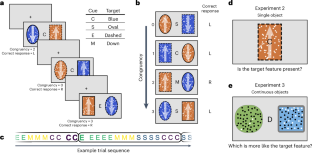Distractor-specific control adaptation in multidimensional environments
IF 21.4
1区 心理学
Q1 MULTIDISCIPLINARY SCIENCES
引用次数: 0
Abstract
Goal-directed behaviour requires humans to constantly manage and switch between multiple, independent and conflicting sources of information. Conventional cognitive control tasks, however, only feature one task and one source of distraction. Therefore, it is unclear how control is allocated in multidimensional environments. To address this question, we developed a multidimensional task-set interference paradigm, in which people need to manage distraction from three independent dimensions. We use this task to test whether people adapt to previous conflict by enhancing task-relevant information or suppressing task-irrelevant information. Three experiments provided strong evidence for the latter hypothesis. Moreover, control adaptation was highly dimension specific. Conflict from a given dimension only affected processing of that same dimension on subsequent trials, with no evidence for generalization. A new neural network model shows that our results can only be simulated when including multiple independent conflict-detector units. Our results call for an update to classic models of cognitive control and their neurocomputational underpinnings. Gheza and Kool show that, in multidimensional environments, people allocate attention to individual distractors on the basis of their interference with the current task. They develop a neural model that supports these findings and suggest that cognitive control theories need to be revised.


多维环境中干扰物特异性控制适应
目标导向的行为要求人类不断地管理和切换多个独立和相互冲突的信息来源。然而,传统的认知控制任务只有一个任务和一个分散注意力的来源。因此,在多维环境中如何分配控制是不清楚的。为了解决这个问题,我们开发了一个多维任务集干扰范式,在这个范式中,人们需要从三个独立的维度管理分心。我们用这个任务来测试人们是通过增强与任务相关的信息还是抑制与任务无关的信息来适应先前的冲突。三个实验为后一种假设提供了强有力的证据。此外,控制自适应具有高度的维度特异性。来自某一特定维度的冲突只会影响在后续试验中对同一维度的处理,没有证据证明可以普遍化。一个新的神经网络模型表明,我们的结果只有在包含多个独立的冲突检测器单元时才能模拟。我们的研究结果要求对认知控制的经典模型及其神经计算基础进行更新。
本文章由计算机程序翻译,如有差异,请以英文原文为准。
求助全文
约1分钟内获得全文
求助全文
来源期刊

Nature Human Behaviour
Psychology-Social Psychology
CiteScore
36.80
自引率
1.00%
发文量
227
期刊介绍:
Nature Human Behaviour is a journal that focuses on publishing research of outstanding significance into any aspect of human behavior.The research can cover various areas such as psychological, biological, and social bases of human behavior.It also includes the study of origins, development, and disorders related to human behavior.The primary aim of the journal is to increase the visibility of research in the field and enhance its societal reach and impact.
 求助内容:
求助内容: 应助结果提醒方式:
应助结果提醒方式:


